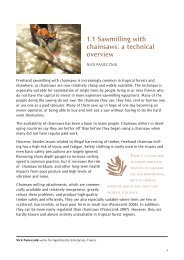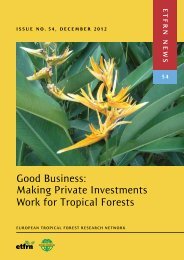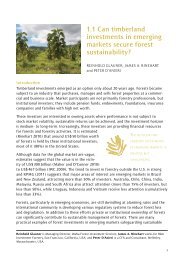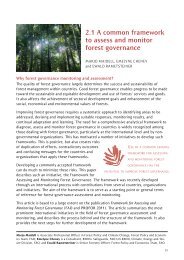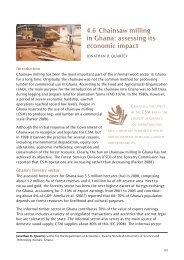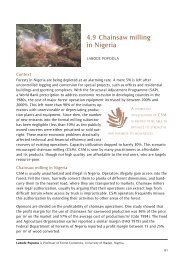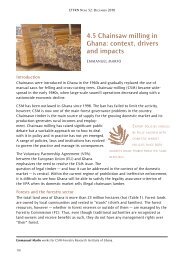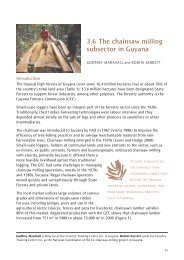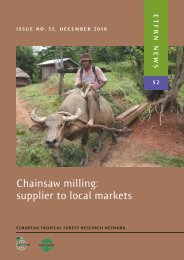Chainsaw milling: supplier to local markets - European Tropical ...
Chainsaw milling: supplier to local markets - European Tropical ...
Chainsaw milling: supplier to local markets - European Tropical ...
You also want an ePaper? Increase the reach of your titles
YUMPU automatically turns print PDFs into web optimized ePapers that Google loves.
ETFRN NEws 52: DEcEmbER 2010<br />
This issue demonstrates that Csm can make a considerable contribution <strong>to</strong> <strong>local</strong><br />
economies, although its benefits are not always equitably distributed. Despite its<br />
importance, Csm is unaccounted for in international and, <strong>to</strong> some extent, national<br />
policies.<br />
National policies: how <strong>to</strong> manage <strong>local</strong> demand for cheap timber<br />
Governments of tropical countries have struggled <strong>to</strong> deal with the Csm subsec<strong>to</strong>r, and<br />
policy responses that effectively address Csm are rare. where the practice is legalized, it<br />
is often associated with abuse and illegalities. where it is banned, it still flourishes and<br />
control is difficult and compromised. Enforcement tends <strong>to</strong> be more effective in cases<br />
where Csm has been legalized. because of Csm’s mobility, the commitment of <strong>local</strong><br />
communities would be key <strong>to</strong> an effective control system, provided that tree tenure was<br />
secure.<br />
most national timber production policies and legislation are primarily concerned with<br />
regulating logging and processing for exports, and forestry is regulated for foreign<br />
currency earnings and job generation. but how can an export-oriented activity satisfy the<br />
<strong>local</strong> timber demand? in many countries, timber production for <strong>local</strong> purposes is as high<br />
or higher than that for export. national governments need <strong>to</strong> start addressing this <strong>local</strong><br />
demand. ignoring it will lead <strong>to</strong> dis<strong>to</strong>rtion of the market and domestic timber prices, and<br />
<strong>to</strong> an increase in illegal activities, conflicts, unsafe practices, loss of revenue <strong>to</strong> the state,<br />
corruption and a loss of forest resources.<br />
in most cases better regulation is needed that considers <strong>local</strong> access rights <strong>to</strong> forest<br />
resources (tree tenure), taxation, enactment of legislation and policies that are perceived<br />
as fair by stakeholders, effective law enforcement, the organization of chainsaw millers,<br />
use of improved Csm technologies, and the equitable distribution of revenues. procedures<br />
need <strong>to</strong> be simple so that <strong>local</strong> people are able <strong>to</strong> comply with their requirements.<br />
policies addressing domestic timber trade can have adverse effects that need <strong>to</strong> be<br />
acknowledged. Timber traders look for options that maximize their benefits, and<br />
increasingly restrictive regulations can operate as a disincentive that will cause traders<br />
<strong>to</strong> shift their <strong>markets</strong> rather than reduce their illegal practices. it is important that<br />
any policy addressing domestic timber trade be designed in a comprehensive way.<br />
The main challenge is <strong>to</strong> design an effective set of incentives for stakeholders (civil<br />
servants, sawyers, traders) <strong>to</strong> comply with the law. regulations must be simple and easily<br />
enforceable, but incentives should be put in place <strong>to</strong> convince stakeholders that they will<br />
earn more from legal activities over the long term than from illegal practices.<br />
Tenure and benefit sharing<br />
national forest authorities need <strong>to</strong> put a system in place <strong>to</strong> improve the process of<br />
resource allocation. Cases presented in this ETFRN News show that secure forms of access<br />
<strong>to</strong> forest resources — at a reasonable cost and with equitable sharing of benefits — are<br />
needed so that forest communities and small-scale loggers can develop sustainable<br />
resource-based livelihoods and avoid unsustainable short-term logging practices.<br />
xx



